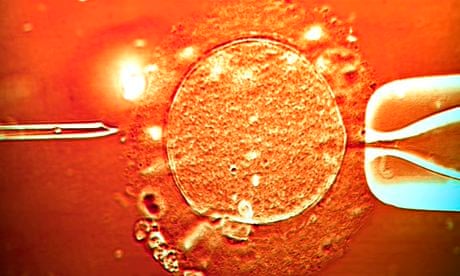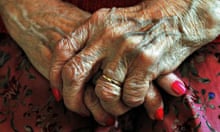NHS organisations have been told by the government's health advisers to stop denying childless couples infertility treatment with decisions that devastate people desperate to start a family.
The National Institute for Health and Care Excellence (Nice) has criticised GP-led clinical commissioning groups (CCGs) in England for betraying the NHS's guiding principle of access to treatment by operating a "postcode lottery" on IVF.
NHS bodies in England and Wales are supposed to have been offering three cycles of IVF to infertile women up to the age of 40 since 2004, when Nice said those who qualified should receive it.
But the policy is widely ignored. Almost three-quarters (73%) of CCGs do not offer the full three cycles, according to a survey in January of 198 of the 211 CCGs. An audit of CCGs' policies by the National Infertility Awareness Campaign (Niac) found that 49% only offered one cycle and 24% offered two. Only 24% offered the recommended three cycles, while a handful did not pay for any IVF treatment at all.
In a new draft quality standard published on Thursday, Nice reiterated its updated guidance of February 2013 that all eligible people with fertility problems should be offered the full treatment and made clear its displeasure at the NHS's widespread defiance of its advice.
Nice is frustrated that access to IVF is highly variable despite iupdated guidance in February 2013.
"Unfortunately we know that not all areas are following our guidance to the letter. This creates variations in treatment within the NHS, which is disappointing and goes against the fundamental aims of the NHS", said Gillian Leng, the watchdog's deputy chief executive and director of health and social care. "Infertility is a recognised medical condition that can affect people of any age and has a potentially devastating effect on people's lives. It can cause significant distress, depression and can possibly lead to the breakdown of relationships", she added. About one in seven couples have difficulty having a child naturally.
Caroline Dinenage, the MP for Gosport in Hampshire, last week told the Commons that women in her constituency were only being offered one cycle of IVF up to the age of 35. Andrew Lansley, the leader of the house and former health secretary, said ministers wanted CCGs to "take full account" of Nice's guidelines.
Nice's guidelines and quality standards are both advisory. Unlike other Nice pronouncements, they are not mandatory across the NHS. Nice said last year that for the first time that women aged 41 and 42 should also receive for one cycle.
Sarah Norcross, Niac's co-chair, said Nice's "strong and clear" message to the NHS should "bring the unfair and unequitable postcode lottery approach to funding to an end".
Susan Seenan, chief executive of the patient charity Infertility Network UK, said: "Let's not forget that infertility is a medical condition and that people with a fertility problem have the same right to be treated by the NHS as anyone else. It is now 10 years since the guideline was first published yet sadly we are still facing an arbitrary approach to IVF funding around the country. Commissioners...need to step up, stick to the Nice guideline and allow patients to access the NHS treatment they are entitled to."
Nice's quality standard also makes clear that CCGs should pay for women and men who are about to undergo chemotherapy to have their eggs or sperm frozen, so they can try to become a parent after their treatment, which can reduce or remove the ability to reproduce.
It follows a recent court victory for 25-year-old Elizabeth Rose, who has a severe form of Crohn's disease, over Thanet CCG in Kent over its refusal to pay for her to undergo cryopreservation.







Comments (…)
Sign in or create your Guardian account to join the discussion